

The Battle of the Philippine Sea was fought 19–20 June 1944 in the waters west of the Mariana Islands by elements of the Imperial Japanese Navy's Combined Fleet and of the United States Navy's Pacific Fleet. The battle resulted from the Japanese reaction to the American invasion of the island of Saipan. Instead of attacking the troop transports off Saipan, Admiral Toyoda chose to engage the American carrier forces in what he intended to be the long-awaited “decisive battle” that would crush U.S. naval power.
The outcome was a disaster for the Japanese Navy. The battle exacted a terrible toll from the Japanese naval air arm, costing them most of their few remaining experienced pilots. The Combined Fleet was no longer capable of serious offensive operations after this engagement. Historian Samuel Eliot Morison characterized it this way:
This was the greatest carrier battle of the war. The forces engaged were three to four times those in preceding actions like Midway, and victory was so complete that the Japanese could never again engage on such a scale. ... above all the skill, initiative, and intrepid courage of the young aviators made this day one of the high points in the history of the American spirit.[1]
Since the Japanese assumed the tactical offensive, their forces are listed first.
Forces deployed
Losses in parentheses
|
|
Japanese order of battle

Mobile Fleet[2]
Vice Admiral Jisaburō Ozawa in Taihō
"A" Force

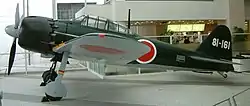


Sortied 13 June from Tawi Tawi anchorage off NE Borneo[3]
Vice Admiral Ozawa
- Carrier Division 1 (Vice Adm. Ozawa)
- Cruiser Division 5 (Rear Adm. Shintaro Hashimoto)
- Screen (Rear Adm. Susumu Kimura in Yahagi)
- 1 light cruiser: Yahagi
- 9 destroyers
- 1 Asashio-class (6 × 5 in. main battery): Asagumo
- 3 Kagerō-class (6 × 5 in. main battery): Isokaze, Tanikaze (sunk by submarine 9 June), Urakaze
- 4 Akizuki-class (8 × 3.9 in. main battery): Akizuki, Hatsuzuki, Wakatsuki, Shimotsuki
- 1 Mutsuki-class (4 × 4.7 in. main battery): Minazuki (sunk by submarine 6 June)
"B" Force

Sortied 13 June from Tawi Tawi anchorage off NE Borneo[3]
Vice Admiral Kakuji Kakuta in Jun'yo
- Carrier Division 2 (Vice Admiral Kakuta)
- 1 old battleship: Nagato
- 1 heavy cruiser: Mogami
- Screen
- 10 destroyers
- 2 Asashio-class (6 × 5 in. main battery): Michishio, Yamagumo
- 2 Kagerō-class (6 × 5 in. main battery): Nowaki, Hamakaze
- 2 Yūgumo-class (6 × 5 in. main battery): Hayashimo, Akishimo
- 4 Shiratsuyu-class (5 × 5 in. main battery): Shiratsuyu (sunk following collision with Seiyo Maru 14 June), Shigure, Samidare, Harusame (sunk by air attack 8 June)
- 10 destroyers
Van Force

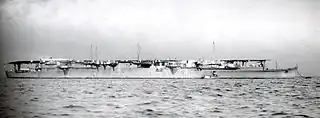

Sortied 12 June from Batjan anchorage off SW Halmahera Island[3]
Vice Admiral Takeo Kurita in heavy cruiser Atago
- Carrier Division 3 (Rear Adm. Sueo Obayashi)
- 3 light carriers
- Chitose
- Chiyoda
- Zuihō
- Air Unit
- 62 Mitsubishi A6M "Zeke" fighters
- 17 Nakajima B5N "Kate" torpedo bombers
- 9 Nakajima B6N "Jill" torpedo bombers
- 3 light carriers
- Battleship Division 1 (Vice Adm. Matome Ugaki)
- Battleship Division 3 (Vice Adm. Yoshio Suzuki)
- Cruiser Division 4 (Vice Adm. Kurita)
- Cruiser Division 7(Vice Adm.Kazutaka Shiraishi)
- Screen (Rear Adm.l Mikio Hayakawa in Noshiro)
Supply Forces

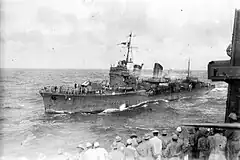
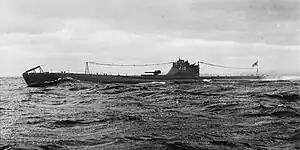

Sortied with Ozawa's carrier forces 13 June from Tawi Tawi anchorage off NE Borneo[3]
- 1st Supply Force
- 4 oilers
- Hayasui, Nichiei Maru, Kokuyo Maru, Seiyo Maru (sunk 20 June)
- 4 destroyers
- 1 Fubuki class (6 × 5 in. main battery): Hibiki
- 1 Hatsuharu class (5 × 5 in. main battery): Hatsushimo
- 1 Kamikaze class (4 × 4.7 in. main battery): Yūnagi
- 1 Momi class (3 × 4.7 in. main battery): Tsuga
- 4 oilers
- 2nd Supply Force
- 2 oilers
- Genyo Maru (sunk 20 June), Azusa Maru
- 2 destroyers
- 1 Kagerō-class (6 × 5 in. main battery): Yukikaze
- 1 Mutsuki-class (4 × 4.7 in. main battery): Uzuki
- 2 oilers
Submarine Forces
Vice Admiral Takeo Takagi at Saipan
- 7 1st-class submarines
- Deployed in two parallel rows SW to NE north of the Admiralties and Bismarcks[4]
- 17 2nd-class submarines[lower-alpha 1]
- Ro-36 (sunk by depth charges 13 June), Ro-41, Ro-42 (sunk by depth charges 10 June), Ro-43, Ro-44 (sunk by depth charges 16 June), Ro-47, Ro-68, Ro-104 (sunk by depth charges 23 May), Ro-105 (sunk by depth charges 31 May), Ro-106 (sunk by depth charges 22 May), Ro-108 (sunk by depth charges 26 May), Ro-112, Ro-113, Ro-114 (sunk by depth charges 17 June), Ro-115, Ro-116 (sunk by depth charges 23 May), Ro-117 (sunk by depth charges 17 June)
American order of battle
.jpg.webp)
.jpg.webp)
US Fifth Fleet[5]
Admiral Raymond A. Spruance in heavy cruiser Indianapolis
Task Force 58 – Fast Carrier Forces
Vice Admiral Marc A. Mitscher in fleet carrier Lexington
Task Group 58.1
.jpg.webp)
_underway_on_22_December_1943_(NH_97269).jpg.webp)


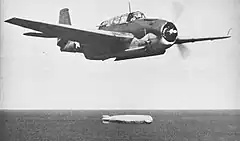
- Carrier Division 13
- Rear Admiral Joseph J. Clark
- 2 fleet carriers
- Hornet (Capt. William D. Sample)
- Air Group 2 (Cmdr. Jackson D. Arnold)
- 36 F6F Hellcat fighters (Lt. Cmdr. W.A. Dean)
- 33 SB2C Helldiver dive bombers (Lt. Cmdr. G.B. Campbell)
- 18 TBF Avenger torpedo bombers (Lt. Cmdr. L.M.D. Ford)
- 4 F6F-xN Hellcat night fighters (Lt. R.L. Reiserer)
- Air Group 2 (Cmdr. Jackson D. Arnold)
- Yorktown (Capt. Ralph E. Jennings)
- Air Group 1 (Cmdr. J.M. Peters)
- 41 F6F Hellcat fighters (Lt. Cmdr. B.M. Strean)
- 40 SB2C Helldiver,4 SBD-5 Dauntless dive bombers (Lt. Cmdr. J.W. Runyan, USNR)
- 17 TBF Avenger torpedo bombers (Lt. Cmdr. W.F. Henry)
- 4 F6F-xN Hellcat night fighters (Lt. A.C. Benjes)
- Air Group 1 (Cmdr. J.M. Peters)
- Hornet (Capt. William D. Sample)
- 2 light carriers
- Belleau Wood (Capt. John Perry)
- Air Group 24 (Cmdr. E.M. Link)
- 26 F6F Hellcat fighters (Lt. Cmdr. Link)
- 9 TBF Avenger torpedo bombers (Lt. R.M. Swensson)
- Air Group 24 (Cmdr. E.M. Link)
- Bataan (Capt. Valentine H. Schaeffer)
- Air Group 50 (Lt. Cmdr. J.C. Strange, USNR)
- 24 F6F Hellcat fighters (Lt. Cmdr. Strange)
- 9 TBF Avenger torpedo bombers (Lt. Cmdr. L.V. Swanson)
- Air Group 50 (Lt. Cmdr. J.C. Strange, USNR)
- Belleau Wood (Capt. John Perry)
- 2 fleet carriers
- Cruiser Division 10 (Rear Admiral Leo H. Thebaud)
- Screen
- 2 anti-aircraft light cruisers[lower-alpha 2] (Rear Admiral Thebaud)
- 14 destroyers (Capt. Clark)
Task Group 58.2

_at_sea_in_1945_(NH_42373).jpg.webp)
_underway_at_sea%252C_26_July_1945_(80-G-262768).jpg.webp)
- Carrier Division 3
- Rear Admiral Alfred E. Montgomery
- 2 fleet carriers
- Bunker Hill (Capt. T.P. Jeter)
- Air Group 8 (Cmdr. R.L. Shifley)
- 37 F6F Hellcat fighters (Lt. Cmdr. W.M. Collins)
- 33 SB2C Helldiver dive bombers (Lt. Cmdr. J.D. Arbes)
- 18 TBF Avenger, torpedo bombers (Lt. Cmdr. K.F. Musick)
- 4 F6F-xN Hellcat night fighters (Lt. Cmdr. E.P. Aurand)
- Air Group 8 (Cmdr. R.L. Shifley)
- Wasp (Capt. Clifton Sprague)
- Air Group 14 (Cmdr. W.C. Wingard)
- 34 F6F Hellcat fighters (Lt. Cmdr. E.W. Biros, USNR)
- 32 SB2C Helldiver dive bombers (Lt. Cmdr. J.D. Blitch)
- 18 TBF Avenger torpedo bombers (Lt. Cmdr. H.S. Roberts, USNR)
- 4 F6F-xN Hellcat night fighters (Lt. J.H. Boyum)
- Air Group 14 (Cmdr. W.C. Wingard)
- Bunker Hill (Capt. T.P. Jeter)
- 2 light carriers
- Cabot (Capt. S.J. Michael)
- Air Group 31 (Lt. Cmdr. R.A. Winston)
- 24 F6F Hellcat fighters (Lt. Cmdr. Winston)
- 9 TBF Avenger torpedo bombers (Lt. E.E. Wood, USNR)
- Air Group 31 (Lt. Cmdr. R.A. Winston)
- Monterey (Capt. Stuart H. Ingersoll)
- Air Group 28 (Lt. Cmdr. R.W. Mehle, USNR)
- 21 F6F Hellcat fighters (Lt. Cmdr. Mehle)
- 8 TBF Avenger torpedo bombers (Lt. Cmdr. R.P. Gift, USNR)
- Air Group 28 (Lt. Cmdr. R.W. Mehle, USNR)
- Cabot (Capt. S.J. Michael)
- 1 heavy cruiser
- Minneapolis (Capt. Harry Slocum)
- 2 fleet carriers
- Cruiser Division 13 (Rear Admiral Laurance T. DuBose)
- 3 light cruisers
- Santa Fe (Capt. Jerauld Wright)
- Mobile (Capt. Charles J. Wheeler)
- Biloxi (Capt. Daniel M. McGurl)
- 3 light cruisers
- Screen
- 12 destroyers
- 9 Fletcher-class (5 × 5 in. main battery): Hickox, Hunt, Lewis Hancock, Marshall, Miller, Owen, Stephen Potter, The Sullivans, Tingey
- 3 Farragut-class (4 × 5 in. main battery): Dewey, Hull, MacDonough
- 12 destroyers
Task Group 58.3

_underway_at_sea_on_22_November_1943.jpg.webp)
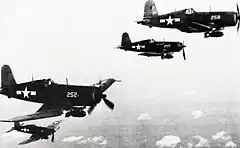
_underway_off_California_on_25_January_1944_(80-G-215947).jpg.webp)
- Carrier Division 2
- Rear Admiral John W. Reeves
- 2 fleet carriers
- Enterprise (Capt. Matthias B. Gardner)
- Air Group 10 (Cmdr. W.R. Kane)
- 31 F6F Hellcat fighters (Lt. R.W. Schumann)
- 21 SBD Dauntless dive bombers (Lt. Cmdr. James D. Ramage)
- 14 TBF Avenger torpedo bombers (Lt. Cmdr. W.I. Martin)
- 3 F4U Corsair night fighters (Lt. Cmdr. R.E. Harmer)
- Air Group 10 (Cmdr. W.R. Kane)
- Lexington (Capt. E.W. Litch)
- Air Group 16 (Cmdr. E.M. Snowden)
- 37 F6F Hellcat fighters (Lt. Cmdr. Ralph Weymouth)
- 34 SBD Dauntless dive bombers (Lt. Cmdr. Weymouth)
- 18 TBF Avenger torpedo bombers (Lt. Cmdr. N.A. Sterrie, USNR)
- 4 F6F-xN Hellcat fighters (Lt. W.H. Abercrombie, USNR)
- Air Group 16 (Cmdr. E.M. Snowden)
- Enterprise (Capt. Matthias B. Gardner)
- 2 light carriers
- San Jacinto (Capt. Harold M. Martin)
- Air Group 51 (Lt. Cmdr. C.L. Moore)
- 24 F6F Hellcat fighters (Lt. Cmdr. Moore)
- 8 TBF Avenger torpedo bombers (Lt. Cmdr. D.J. Melvin)
- Air Group 51 (Lt. Cmdr. C.L. Moore)
- Princeton (Capt. W.H. Buracker)
- Air Group 27 (Lt. Cmdr. E.W. Wood – KIA)
- 24 F6F Hellcat fighters (Lt. Cmdr. Wood)
- 9 TBF Avenger torpedo bombers (Lt. Cmdr. S.M. Haley, USNR)
- Air Group 27 (Lt. Cmdr. E.W. Wood – KIA)
- San Jacinto (Capt. Harold M. Martin)
- 2 fleet carriers
- 1 heavy cruiser
- Indianapolis (Capt. E.R. Johnson)
- Cruiser Division 12 (Rear Admiral Robert W. Hayler)
- 3 light cruisers
- Montpelier (Capt. H.D. Hoffman)
- Cleveland (Capt. A.G. Shepard)
- Birmingham (Capt. Thomas B. Inglis)
- 3 light cruisers
- Screen
Task Group 58.4
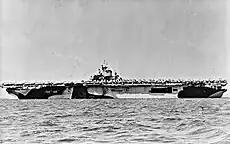
_underway_in_San_Francisco_Bay_on_29_August_1945_(NH_98189).jpg.webp)
_underway_at_sea_on_23_March_1944_(80-G-232122).jpg.webp)
- Carrier Division 12
- Rear Admiral William K. Harrill
- 1 fleet carrier
- Essex (Capt. Ralph A. Ofstie)
- Air Group 15 (Cmdr. David McCampbell)
- 38 F6F Hellcat fighters (Lt. Cmdr. C.W. Brewer -- KIA)
- 36 SB2C Helldiver dive bombers (Lt. Cmdr. J.H. Mini)
- 20 TBF Avenger torpedo bombers (Lt. Cmdr. V.G. Lambert)
- 4 F6F-xN Hellcat night fighters (Lt. R.M. Freeman)
- Air Group 15 (Cmdr. David McCampbell)
- Essex (Capt. Ralph A. Ofstie)
- 2 light carriers
- Langley (Capt. W.M. Dillon)
- Air Group 32 (Lt. Cmdr. E.C. Outlaw)
- 23 F6F Hellcat fighters (Lt. Cmdr. Outlaw)
- 9 TBF Avenger torpedo bombers (Lt. D.A. Marks)
- Air Group 32 (Lt. Cmdr. E.C. Outlaw)
- Cowpens (Capt. H.W. Taylor)
- Air Group 25 (Lt. Cmdr. R.H. Price)
- 23 F6F Hellcat fighters (Lt. Cmdr. Price)
- 9 TBF Avenger torpedo bombers (Lt. R.B. Cottingham, USNR)
- Air Group 25 (Lt. Cmdr. R.H. Price)
- Langley (Capt. W.M. Dillon)
- 1 fleet carrier
- Cruiser Division 14 (Rear admiral Wilder D. Baker)
- Screen
- 1 anti-aircraft light cruiser[lower-alpha 4]
- San Diego (Capt. L.J. Hudson)
- 14 destroyers
- 6 Fletcher-class (5 × 5 in. main battery): Charles Ausburne, Stanly, Dyson, Converse, Spence, Thatcher
- 1 Mahan-class (5 × 5 in. main battery): Case
- 3 Gleaves-class (4 × 5 in. main battery): Lansdowne, Lardner, McCalla
- 4 Benham-class (4 × 5 in. main battery): Lang, Sterett, Wilson, Ellet
- 1 anti-aircraft light cruiser[lower-alpha 4]
Task Group 58.7


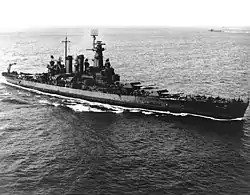
_before_World_War_II.jpg.webp)

Commander, Battleships, Pacific Fleet
Vice Admiral Willis Augustus Lee
- Battleship Division 6 (Vice Admiral Lee)
- 2 North Carolina class
- North Carolina (Capt. Frank P. Thomas)
- Washington (Capt. Thomas R. Cooley)
- 2 North Carolina class
- Battleship Division 7 (Rear Admiral Olaf M. Hustvedt)
- 2 Iowa class
- Iowa (Capt. John L. McCrea)
- New Jersey (Capt. Carl F. Holden)
- 2 Iowa class
- Battleship Division 8 (Rear Admiral Glenn B. Davis)
- 1 South Dakota class
- Indiana (Capt. Thomas J. Keliher Jr.)
- 1 South Dakota class
- Battleship Division 9 (Rear Admiral Edward Hanson)
- 2 South Dakota class
- South Dakota (Capt. Ralph S. Riggs)
- Alabama (Capt. Fred D. Kirtland)
- 2 South Dakota class
- Cruiser Division 6 (Rear Admiral C. Turner Joy)
- 3 heavy cruisers
- Wichita (Capt. J.J. Mahoney)
- New Orleans (Capt. J.E. Hurff)
- San Francisco (Capt. Harvey Overesch)
- 3 heavy cruisers
- Screen
- 14 destroyers
- 1 Porter-class (8 × 5 in. main battery): Selfridge
- 9 Fletcher-class (5 × 5 in. main battery): Halford, Guest, Bennett, Fullam, Hudson, Yarnall, Twining, Stockham, Monssen
- 3 Bagley-class (4 × 5 in. main battery): Bagley, Mugford, Patterson
- 1 Mahan-class (5 × 5 in. main battery): Conyngham
- 14 destroyers
Seventh Fleet Submarines

Rear Admiral Ralph W. Christie (HQ at Fremantle)
- Southeast of Mindanao
- 3 Gato-class (10 tubes: 6 forward, 4 aft): Hake, Bashaw, Paddle
- IJN anchorage at Tawi Tawi
- 3 Gato-class (10 tubes: 6 forward, 4 aft): Harder, Haddo[lower-alpha 5], Redfin
- Off Luzon
- 2 Gato-class (10 tubes: 6 forward, 4 aft): Bluefish, Jack, Flier
Task Force 17
.jpg.webp)
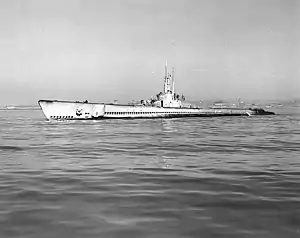
Patrol Submarines
Vice Admiral Charles A. Lockwood (HQ at Pearl Harbor)
- At the Bonins
- 2 Balao-class (10 tubes: 6 forward, 4 aft): Archerfish, Plaice
- 1 Gar-class (10 tubes: 6 forward, 4 aft): Gar
- 1 Sargo-class (8 tubes: 4 forward, 4 aft): Swordfish
- 1 Porpoise-class (6 tubes: 4 forward, 2 aft): Plunger
- Southeast of Formosa and eastward
- 2 Balao-class (10 tubes: 6 forward, 4 aft): Pintado, Pilotfish
- 1 Gato-class (10 tubes: 6 forward, 4 aft): Tunny
- East and Southeast of the Marianas
- 2 Gato-class (10 tubes: 6 forward, 4 aft): Albacore, Finback
- 1 Balao-class (10 tubes: 6 forward, 4 aft): Bang
- 1 Salmon-class (8 tubes: 4 forward, 4 aft): Stingray
- 1 Sargo-class (8 tubes: 4 forward, 4 aft): Seawolf
- Ulithi and the Philippines
- 3 Gato-class (10 tubes: 6 forward, 4 aft): Flying Fish, Muskallunge, Cavalla
- 2 Balao-class (10 tubes: 6 forward, 4 aft): Seahorse, Pipefish
- Off Surigao Strait
- 1 Gato-class (10 tubes: 6 forward, 4 aft): Growler
Notes
- ↑ Ro-104, Ro-105, Ro-106, Ro-108, Ro-116 all sunk by destroyer escort England
- ↑ These cruisers were intended as destroyer leaders when designed. After the first two to be used in this role, Atlanta and Juneau, were lost at the Naval Battle of Guadalcanal, this mission was rejected and the anti-aircraft mission adopted.[6]
- ↑ These cruisers were intended as destroyer leaders when designed. After the first two to be used in this role, Atlanta and Juneau, were lost at the Naval Battle of Guadalcanal, this mission was rejected and the anti-aircraft mission adopted.[6]
- ↑ These cruisers were intended as destroyer leaders when designed. After the first two to be used in this role, Atlanta and Juneau, were lost at the Naval Battle of Guadalcanal, this mission was rejected and the anti-aircraft mission adopted.[6]
- ↑ Skippered by Cmdr. Chester W. Nimitz, Jr.
References
Bibliography
- Morison, Samuel Eliot (1953), New Guinea and the Marianas, March 1944 – August 1944, History of United States Naval Operations in World War II, vol. VIII, Boston: Little, Brown and Co.
- Silverstone, Paul H. (1970). U.S. Warships of World War II. Garden City, NY: Doubleday and Co. ISBN 0-8702-1773-9.
- Stille, Mark (2016). US Navy Light Cruisers, 1941-45. Oxford: Osprey Publishing, Ltd. ISBN 978-1-4728-1140-0.
- Watts, A.J. (1966). Japanese Warships of World War II. Shepperton, Surrey: Ian Allan Ltd. ISBN 0-7110-0215-0.